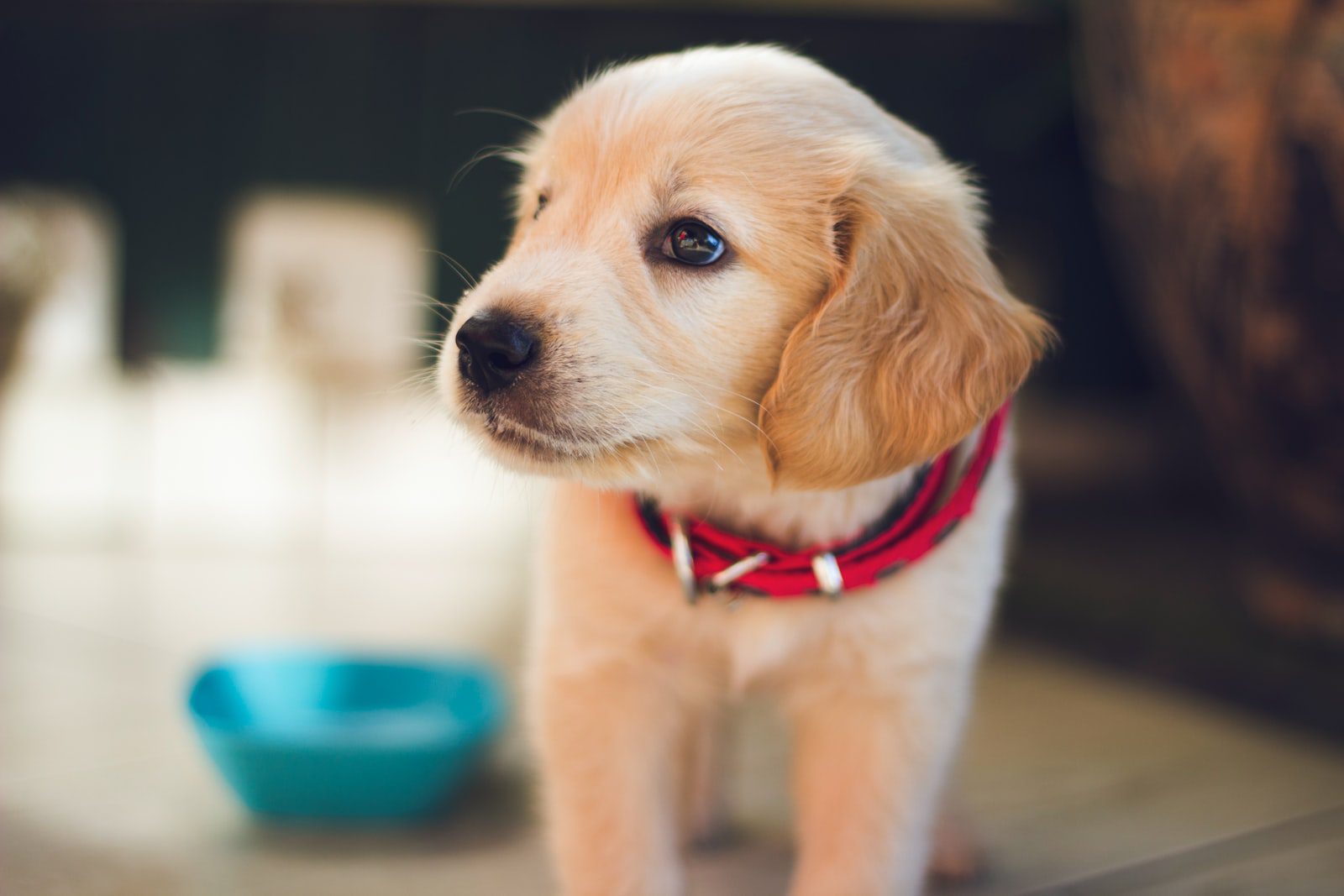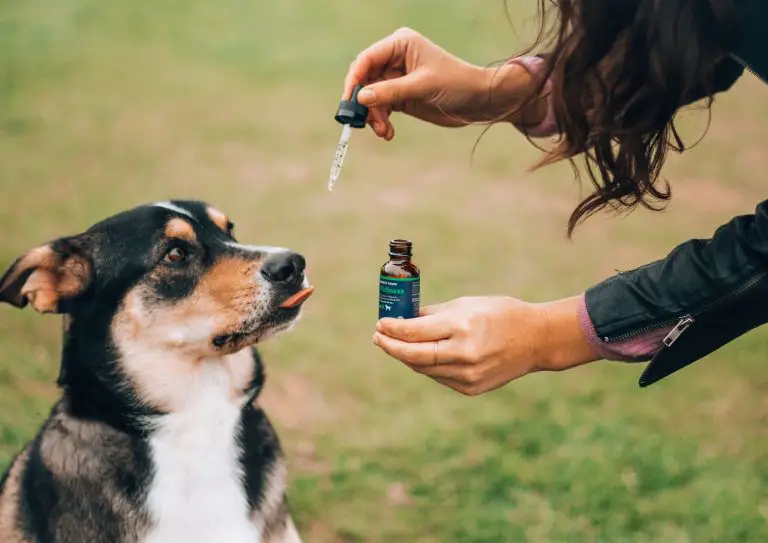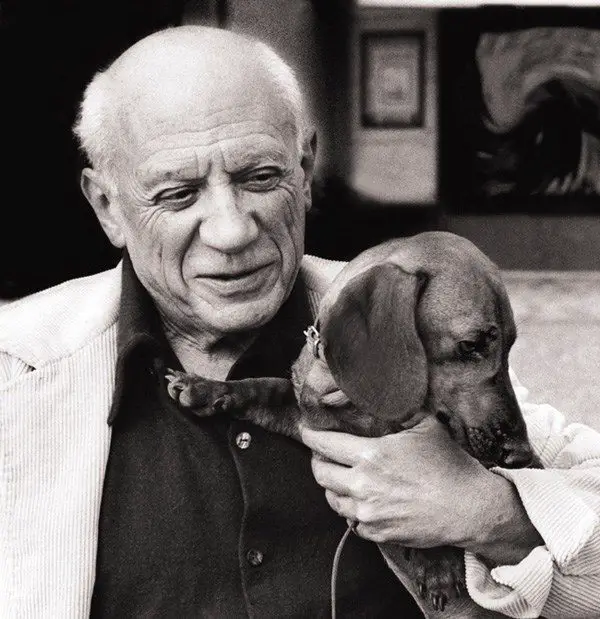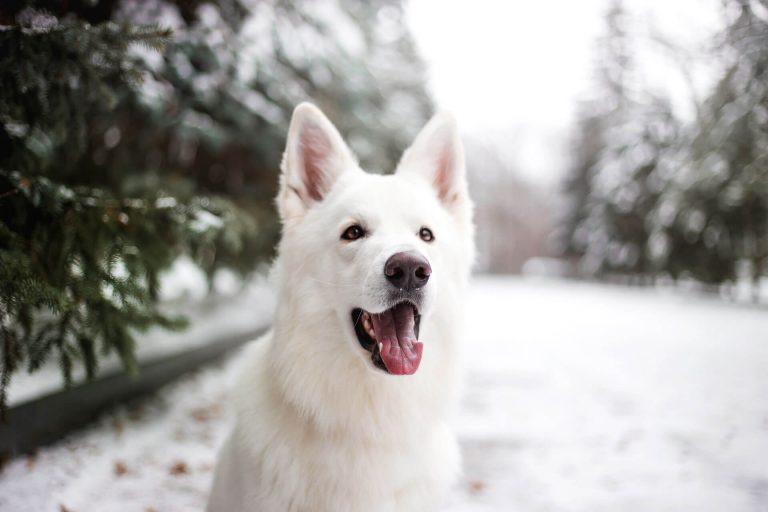If you are someone who adores dogs like us, you most likely cannot take your eyes off little puppies too! Those tiny creatures are adorable and full of joy. The minute they look at you and make that innocent little face, you cannot help but be smitten by their presence. That is when you decide to bring the little guy home, are we right?
If you owned a dog before, you might think that raising a puppy is similar to a great extent. That, however, is hardly the case. A dog is already grown up, but when you bring a puppy home, you need to take care of it like a baby and train it properly, so it grows up in the right way. You might notice things about your puppy that you never observed in your dog, and these things become a learning experience for any new puppy owner.
One of the most surprising things that might catch you off guard is your puppy’s appetite. It will gobble up the food you put in its bowl in a matter of seconds and lick the bowl until the very last crumb.
It will then follow you around for some more scraps, making you feel like you didn’t feed it well enough. Puppies’ stomachs may seem like bottomless pits and can make you ask this ubiquitous question: “Why is my puppy always hungry?”
Before you decide for your puppy or take it to the vet, you need to understand the reasons behind your puppy’s voracious desire for food and then figure out steps within your control to handle it. There are numerous reasons for increased appetite, so keep reading further if you have ever asked yourself, “What can I do when my puppy is always hungry?”
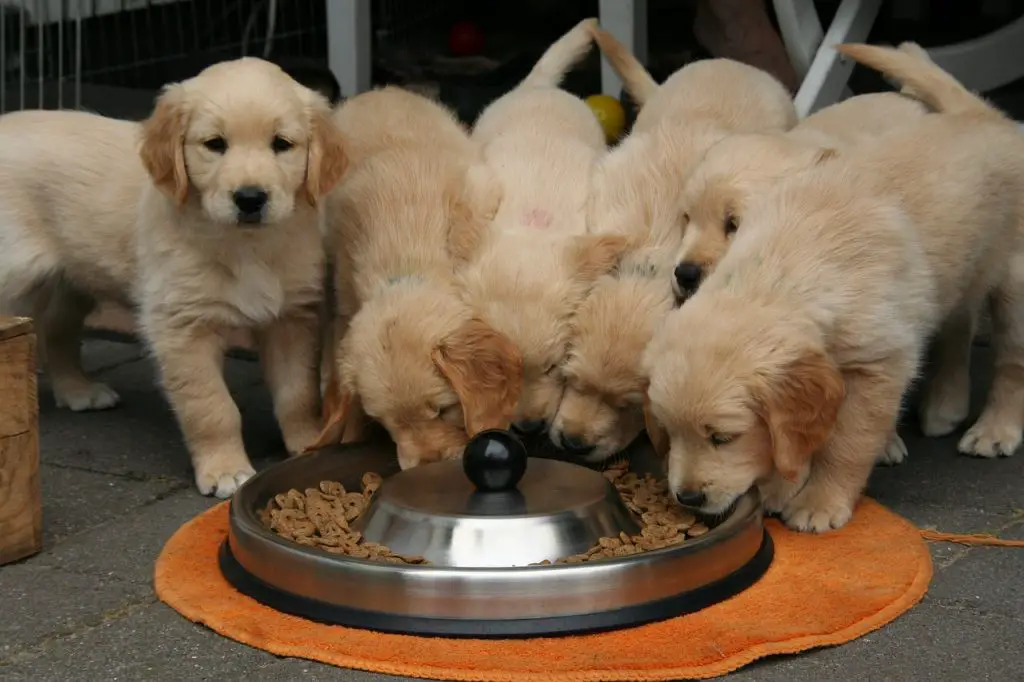
What Is Making My Puppy to Be Always Hungry?
Your puppy can feel that it is always hungry due to the following 3 main reasons.
Just like human babies need more nutrients than adults, a puppy also needs more nutrients (almost twice) than an adult dog to support the growth phase that its little body is in. This happens from birth up to six months of age. When the puppy is still nursing and near its mother, it can always get the nutrients it needs, whenever it wants, but when you bring it home, you will notice drastic changes in appetite.
Puppies need to eat very often with smaller time intervals, and you need to ensure that you are giving them enough food. Giving too little food can hamper their growth, but giving too much until they can’t eat can lead to extra weight gain and health issues. Hence, you need to find the correct balance for your hungry puppy.
When puppies are newly born, they have a continuous supply of food at their disposal. Their nursing mother is always close by to give them milk. However, when the puppy goes home with its owner, it is exposed to a brand new eating schedule and nutrients in several different forms.
From a constant supply to waiting for their next meal, puppies find it hard to adapt to this new routine. They might experience the feeling of being overexcited and too hyper. Since this is a significant change to the process, it is crucial to stick to a consistent routine that your hungry puppy can get used to.
Dogs and puppies are said to have an intuitive nature or a “feast” mentality. This means that your puppy isn’t getting enough kibble because of what its instincts are telling it. Its subconscious is telling it to eat as much food as possible because it doesn’t know when it will get to eat next.
This canine mentality is most imminent in dogs and puppies that come from the wild. This mentality is also accompanied by other untamed behaviors exhibited by puppies, like hiding food for later or guarding their food so no one can take it away. It is vital to put an end to this behavior by giving food at fixed intervals and training, so your hungry puppy knows when it will get its next meal.
Watch the following video on why is my puppy always hungry.
What Are Medical Causes for Rising Appetites in Puppies?
Dr. Jules Benson, Vice President of Veterinary Services at PetPlan Insurance, says that puppies may have a rapacious appetite because of the underlying health issues. “While some dogs simply like to indulge in food, sometimes an increased appetite is the sign of an underlying health issue,”
Let us now look at some common diseases that cause an increase in a puppy’s appetite:
Diabetes is a prevalent disease that can result in an out sized appetite. A surplus of glucose in the bloodstream but a lack of insulin causes the glucose to be completely locked out of the body’s cells. The cells react by telling the puppy that it is still hungry and that it should still eat, resulting in an unusually large appetite.
Cushing’s Disease, or Hyperadrenocorticism, is a condition where a puppy’s body produces too much glucocorticoid. Glucocorticoid is a hormone produced in adrenal glands that helps these little creatures deal with stress, but an excess can cause illness.
Having too much of this hormone can cause a substantial increase in a puppy’s appetite. It may also cause increased urination, increased thirst, hair loss, and panting.
This condition is mostly found in German Shepherd dogs and puppies. It causes a decrease in the enzymes required by the puppy’s body to digest the food.
Food is not broken down properly as it passes through the digestive tract, and hence the nutrients are not absorbed into the puppy’s body, causing it to feel hungrier than before.
Small Intestinal Bacterial Overgrowth (SIBO) can cause the small intestine walls to be damaged by microorganisms and parasites. This may result in or cause a chronic small intestinal disease. Bacterial overgrowth disease allows reduced nutrient absorption and increased appetite in dogs and puppies.
Malabsorption is any condition that does not allow puppies to properly absorb the nutrients in their food, resulting in extra hunger. EPI and SIBO also result in malabsorption. This condition is often accompanied by vomiting or diarrhea and a constant feeling of being hungry.
So the next time your trained puppy begs for more food out of the blue, and you ask yourself, “why is my puppy always hungry?” you might want to take it to a vet to see if it has contracted a disease.

Are You Giving in to Puppy Dog Eyes and Overfeeding Your Puppy?
Sometimes, it is hard to resist your cute buddy’s big, soulful eyes. Thus, a lot of owners give their puppies treats whenever they look up to them lovingly. This food-seeking behavior reinforces the puppy to continue acting in this way, and the behavior just keeps on getting stronger.
The puppy knows it will get a treat each time it makes those sad, adorable eyes, and the owner thinks that the puppy is always hungry since it will eat the treat every single time. If your puppy realizes that it can get extra food by merely begging, it’ll do it. You should never give in to your puppy’s demands. This cycle must be broken because it can cause overeating, which presents many other health concerns for the puppy.
Watch the following video on how many times a day should you feed a puppy or a dog.
Is My Puppy Eating a Lot for Prolonged Survival?
Another explanation as to why your puppy is always hungry could be that it did not receive sufficient food in the past. This is especially popular amongst rescue and stray puppies or those adopted from a shelter. These puppies think that they still need to eat a lot to stay alive.
Since past incidents cause this behavior, it is even more challenging to stop it. You must make your puppy feel safe by sticking to an eating schedule, so it knows that it no longer has to look out for its survival or sources of food because it has you in its life now.
How to Handle a Puppy That Is Always Hungry?
Crushing the cravings takes time, and a lot of effort is required from your puppy to adapt to a healthy routine you are trying to set for it.
Generally, puppies tend to have large appetites since they are growing so fast, but puppy owners also have to make sure that they are getting the right nutrients in the right amounts and at the right time of the day to enable their growth.
Now, we will look at ways in which you can manage your puppy’s appetite so you can finally stop asking yourself, “Why is my puppy always hungry?”
The first step is to figure out if you’re feeding your puppy the right amount of food, which involves considering your puppy’s daily calorie requirements. You can do this by evaluating factors like your puppy’s gender, activity levels, and age.
You should also check your puppy’s weight. If your puppy has the correct body weight according to the factors mentioned, then it is eating the right quantity of food. If you can see your puppy’s ribs, then it might be underweight, and you need to give him more food than you usually do.
Humans are often the reason why puppies seem so hungry most of the time. They sneak food to their puppies here and there, especially when they make their innocent puppy dog face. Once the puppy figures out that they will get its treat every time it makes a specific expression, it will repeat the same habit again and again.
Giving a treat to your puppy might make you feel like you are being kind and satisfying its hunger, but it can lead to your puppy always appearing hungry, mainly when there is food around. Hence, if you want to reduce your puppy’s appetite, stop responding to its puppy dog face.
Since puppies are in the growth phase of their lives, it is crucial to ensure that they get the maximum nutrients they need. Using low-quality puppy food might not give your puppy’s body the required energy and may also make it sick. You need to make sure that you use high-quality dog food formulated for young dogs and has a lot of fillers. Puppies need higher amounts of calories, protein, and calcium than adult dogs, and a puppy formulated food would provide that.
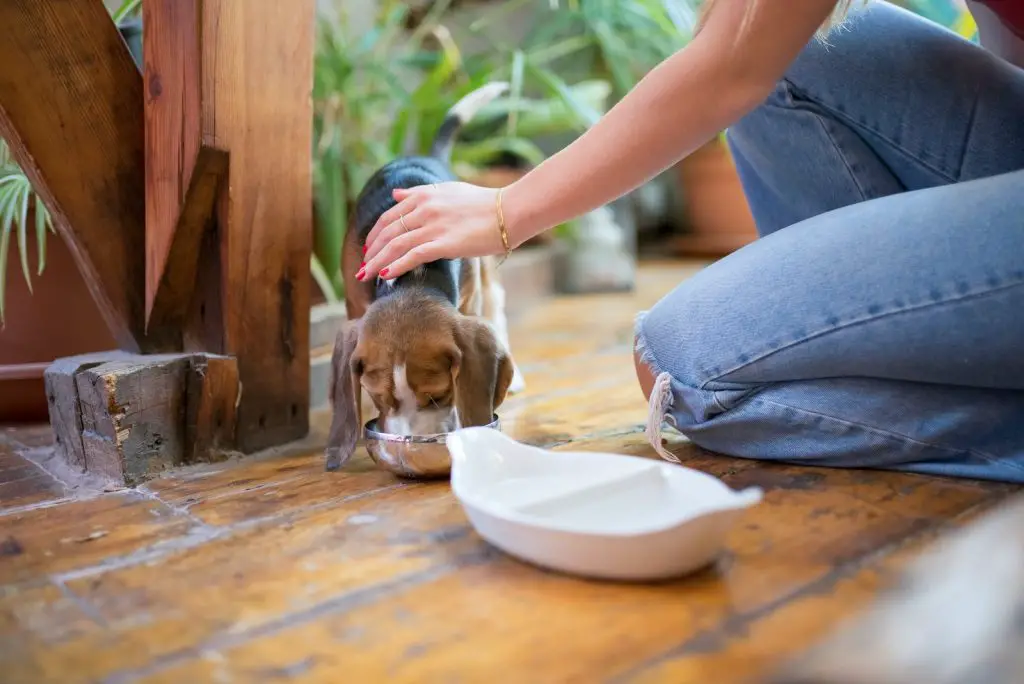
Since you have assessed the daily calorie requirements, divide them into different time intervals. Give your puppy one meal in the morning, once or twice in the afternoon, and one in the evening around 6:00 pm so there is enough time for your puppy to digest and poop before sleeping. If you feed your puppy several times a day, it will keep some food in its stomach. This will fuel the puppy’s development and support big bursts of energy that puppies usually get.
Vets sometimes recommend giving canned pumpkin, carrots, and other hale and hearty treats to puppies between meals. You should always ask a vet before giving new food to your puppy to ensure it is safe for your pet.
Human food is a definite no for your puppy. Avoid giving bits and pieces from what you are eating to your puppy since it can be poisonous for it. Not all human food is harmful to a puppy, but just to be on the safe side, get your puppy its food that is made, especially for its growth.
You should add some water to your puppy’s meal as it can slow it down and avert it from eating everything in just a few seconds. It is frequently suggested that you dampen your puppy’s food when your puppy is only a few weeks old.
Squashing up the food with a fork makes it easier to eat as well. As puppies get older, reduce the water until you’re giving them nothing but dry kibble.
This is a distinct proclamation for most breeds. A Bloodhound will eat more than a Shih Tzu. However, for species that don’t vary much in physical appearance, it is essential to note everyday feeding requirements for the breed of puppy that you have.
Labrador puppies not only have the usual puppy desire to eat constantly, but they are also known to wolf down their food fast and come back begging for more.
Final Words on Why My Puppy Is Always Hungry
Part of your job as a puppy owner is to train your puppy and teach it good eating habits. Do not let your puppy influence you into giving it more food or having overweight and hungry dogs for years.
Try to practice good habits in front of your pet and avoid eating irregularly. Some breeds are very smart and can learn just by observing. Never feed your puppy from your dinner table as it promotes begging and can instill a bad habit in your sweet creature.
With your sweet nurturing, a hungry puppy will eventually learn to have control over its eating patterns. Be sure to keep an eye out for any unusual changes in your puppy’s behavior or routine, and if the problem persists, contact your vet at the earliest.
Let us know in the comments below if you have stopped asking yourself, “why your puppy is always hungry?” after giving this blog a read. For further assistance on puppy-related matters, keep an eye out for more exciting reads!
References
- Smyth, Dr. Kim. “Common Glandular Disorders In Pets.” Petplan, 19 Dec. 2013, www.gopetplan.com/blogpost/common-glandular-disorders-in-dogs-and-cats.
- Smyth, Dr. Kim. “Exocrine Pancreatic Insufficiency.” Petplan, 31 May 2012, www.gopetplan.com/blogpost/digestion-dilemma-petplan-pet-insurance-explores-exocrine-pancreatic-insufficiency.
- Smyth, Dr. Kim. “Sugar, Sugar: Dr. Kim Smyth Details The Different Types Of Diabetes.” Petplan, 10 Dec. 2013, www.gopetplan.com/blogpost/type-I-and-type-II-diabetes-in-dogs-and-cats.
- “Feeding A Puppy – A Complete Guide.” Dogtime, 3 Dec. 2019, dogtime.com/puppies/218-feeding-puppies.
- Milan, Cesar. “Puppy Feeding Guidelines: Schedule & Tips.” Cesar’s Way, 18 Oct. 2019, www.cesarsway.com/puppy-feeding-guidelines.
- Pierce, Ft. “Why Is My Dog Eating More than Usual?” Animal Emergency & Referral Center, 16 Aug. 2016, www.animalemergency.net/why-is-my-dog-eating-more-than-usual/.

